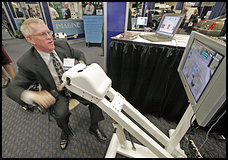|
|
It's Gee-Whiz for the Golden Years
By Mike Musgove, The Washington Post
December 13, 2005

Donald Spatch, of the U.S. Department of Veterans Affairs, demonstrates Game Cycle, which helps seniors build and maintain upper-body strength. (By Linda Davidson -- The Washington Post)
Meet Chester the Talking Pill, Guido the interactive walker and Pearl, a personal robot designed to carry groceries or dirty dishes to the kitchen with a simple voice command.
Researchers dreaming up such high-tech innovations to make the lives of senior citizens easier are convening this week at an unusual technology exhibition at the Marriott Wardman Park Hotel in Woodley Park. The event, timed to coincide with a once-a-decade White House Conference on Aging, is open to the public today.
While new tech products are usually focused on the young and hip, the technologists at the 30 or so companies making an appearance here are taking the same components used in, say, the latest flashy "smart phone" to help those in their golden years maintain control over their lives.
A watch from Intel Corp. could beam medication reminders to a patient's television set -- or place a discreet reminder phone call, for those wanting more privacy. Chester the Talking Pill, designed at the University of Rochester, is a wall-mounted LCD screen with a built-in software avatar trained to tell patients anything about their prescription drugs.
As more baby boomers hit retirement, the potential market for such appliances will become enormous, said Russell Bodoff, executive director of tech industry coalition Center for Aging Services Technologies. "There is an aging tsunami ahead of us," he said.
Bodoff said tech innovations could give doctors a stack of useful data to work with when making diagnoses -- or give them critical warning information before a medical emergency occurs. Thus, many of the services or products at the exhibition combine intense patient monitoring with computer-aided pattern recognition tools.
Home Free Inc. offers monitoring services for senior citizens, tracking patients via watches or pendants with built-in wireless technology.
"We know when you woke up, where you go in the typical day and how many times you woke up at night," said Guy Lerner, president of the company, which has offices in Israel and Milwaukee. "The idea is to proactively alert the family before something goes wrong."
Guido the walker, developed by Carnegie Mellon University, uses similar wireless technology to help Grandma find her way through large buildings -- or to help the walker find Grandma; she can summon it by remote control.
While some such gadgets have a high gee-whiz factor, others aim to blend technology into familiar environments. A team at the University of Virginia, for example, has developed a bed with hidden, built-in sensors to track subjects' breathing rates and blood pressure, as well as how restless or restful their sleep is. Floors with similar concealed sensors can monitor subjects' gaits and automatically compare that to how they walked last month or last year.
Even computer games of solitaire are being re-engineered as diagnostic tools, with software designed to keep track of a patient's motor skills over the years and to send up a warning if the person starts to make unusual mistakes. Other games have been designed from scratch to keep the mind of seniors alert and prevent the onset of Alzheimer's.
"This is not your grandparent's nursing home," said Eric Dishman, an energetic social scientist with chipmaker Intel, as he talked about experimental products his company is trying to push to the market.
Dishman said he hopes that technology can get far enough along to intelligently alter drug dosages on a day-by-day basis. And maybe cell phones can be built with embedded technology to detect the early onset of Parkinson's disease.
Are senior citizens ready to build up their tech quotient? Dishman thinks so. "I think we're treating today's seniors like they are unable to learn something," he said. "We have to stop infantilizing them."
|
|



